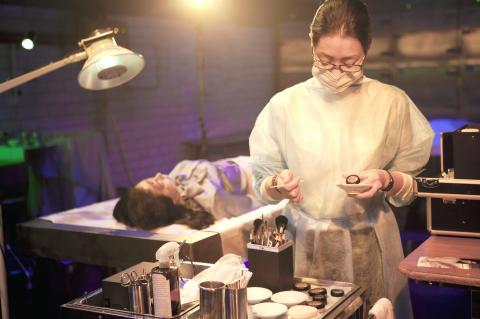Director Lien Yi-chi (連奕琦) takes on lesbian love and death in his debut feature Make Up (命運化妝師). Boasting exquisite cinematography and solid acting from a well-chosen cast, the slickly produced movie is a competent stab at a genre that is rarely tackled in Taiwanese cinema, but a flawed script lets the project down.
Promising young actress Nikki Hsieh (謝欣穎) plays Min-hsiu, a mortuary beautician who prefers the company of the dead to that of the living. Her quiet life is disrupted when the cosmetologist discovers that her new assignment is working on the body of her former high school teacher, Chen Ting (Sonia Sui, 隋棠), who is believed to have committed suicide. Through a series of flashbacks, we quickly learn that Ming-hsiu had a lesbian romance with Chen during her teen years.
Heartbroken by his wife’s death, affluent psychiatrist Nie (Matt Wu, 吳中天) approaches Min-hsiu in the hope of discovering more about Chen’s past. Meanwhile, detective Kuo (Ray Chang, 張睿家) seeks the beautician’s help in investigating the death.

Photo Courtesy of Good Day Films
As she delves into the truth behind her ex-lover’s self-destruction, Min-hsiu gradually unearths the secrets and inner demons that haunt not only Nie and Kuo, but herself as well.
Despite the looks of a thriller, the film is more of a study on the dark side of human nature than a mystery-solving exercise.
The challenge is partially met by the well-cast actors, who carry the narrative forward without falling foul of melodramatic cliche. One example is Wu, who, after years of struggling with poorly written roles, finally plays a flesh and blood character. He shows that he is capable of delivering expressive cadences and nuanced emotions as a man tortured by love. Another pleasant surprise is model-turned-actress Sui, who illuminates her character with a gripping fragility and a sense of despair, and whose debut performance on the silver screen is marked by restraint.
As forceful and telling as the actors are, the atmospheric cinematography by Canada-educated Randy Che (車亮逸) weaves together a delicate play of light and shadow, accentuating moods and emotions with a kaleidoscope of tones and luminosities.
The film’s obvious failing lies in its underdeveloped script, which lacks adequate detail to fully develop the characters. For example, the taboo love between Chen and Min-hsiu doesn’t come across as intense enough. Similarly, more screen time is needed to explain the psychiatrist’s transformation from a loving husband to a lost soul.
After female director Cho Li’s (卓立) unsuccessful mystery thriller Zoom Hunting (獵豔) last year, Make Up is a more polished effort and one step closer to a well-narrated story that audiences can empathize with.

A “meta” detective series in which a struggling Asian waiter becomes the unlikely hero of a police procedural-style criminal conspiracy, Interior Chinatown satirizes Hollywood’s stereotypical treatment of minorities — while also nodding to the progress the industry has belatedly made. The new show, out on Disney-owned Hulu next Tuesday, is based on the critically adored novel by US author Charles Yu (游朝凱), who is of Taiwanese descent. Yu’s 2020 bestseller delivered a humorous takedown of racism in US society through the adventures of Willis Wu, a Hollywood extra reduced to playing roles like “Background Oriental Male” but who dreams of one day

Gabriel Gatehouse only got back from Florida a few minutes ago. His wheeled suitcase is still in the hallway of his London home. He was out there covering the US election for Channel 4 News and has had very little sleep, he says, but you’d never guess it from his twinkle-eyed sprightliness. His original plan was to try to get into Donald Trump’s election party at Mar-a-Lago, he tells me as he makes us each an espresso, but his contact told him to forget it; it was full, “and you don’t blag your way in when the guy’s survived two

Nov. 18 to Nov. 24 Led by a headman named Dika, 16 indigenous Siraya from Sinkan Village, in what is today’s Tainan, traveled to Japan and met with the shogun in the summer of 1627. They reportedly offered sovereignty to the emperor. This greatly alarmed the Dutch, who were allies of the village. They had set up headquarters on land purchased from the Sinkan two years earlier and protected the community from aggressive actions by their more powerful rivals from Mattau Village. The Dutch East India Company (VOC) had been embroiled in a bitter trade dispute with Japan, and they believed

The self-destructive protest vote in January that put the pro-People’s Republic of China (PRC) side in control of the legislature continues to be a gift that just keeps on giving to the Chinese Nationalist Party (KMT). Last week legislation was introduced by KMT Legislator Weng Hsiao-lin (翁曉玲) that would amend Article 9-3 of the Act Governing Relations Between the People of the Taiwan Area and the Mainland Area (臺灣地區與大陸地區人民關係條例) to permit retired and serving (!) military personnel to participate in “united front” (統戰) activities. Since the purpose of those activities is to promote annexation of Taiwan to the PRC, legislators